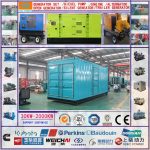Introduction:
In today's modern world, uninterrupted power supply is indispensable for various industries, commercial establishments, and critical infrastructure. However, certain environments pose unique challenges to power generation, particularly high-temperature conditions. In Diesel Generator For Sale , diesel generators serve as a reliable source of power, capable of withstanding extreme heat and delivering consistent performance. This article explores the key considerations, design features, and maintenance practices associated with diesel generators for high-temperature operation.
1. Understanding High-Temperature Challenges:
High-temperature environments, such as desert regions or industrial settings with intense heat, require power generation systems that can operate effectively under extreme conditions. Traditional power sources may struggle to function optimally, leading to frequent breakdowns and compromised performance. Diesel generators offer a suitable solution by leveraging their robust construction, efficient cooling mechanisms, and specialized components designed to withstand elevated temperatures.
2. Key Design Considerations:
When it comes to diesel generators for high-temperature operation, several design considerations are critical to ensure reliable performance. These considerations include:
a) Cooling Systems:
Efficient cooling systems are vital for diesel generators operating in high-temperature environments. Air-cooled and liquid-cooled systems are commonly used to maintain optimum operating temperatures. Air-cooled systems leverage fans and ventilation to dissipate heat, while liquid-cooled systems employ coolants to regulate temperature. The choice between these cooling systems depends on factors such as generator size, application, and ambient temperature.
b) Heat Resistance:
Diesel generators designed for high-temperature operation incorporate heat-resistant materials and insulation to minimize the impact of extreme temperatures. Heat-resistant coatings, specialized alloys, and insulation ensure that critical components, such as engine blocks, alternators, and electrical wiring, are protected from the adverse effects of heat.
c) Fuel System Optimization:
Efficient fuel systems are crucial for diesel generators' performance in high-temperature environments. Ensuring proper fuel filtration, temperature control, and monitoring help prevent fuel degradation and enhance overall engine efficiency. Robust fuel systems also minimize the risk of fuel line clogging, which can lead to unexpected shutdowns and decreased reliability.
3. Maintenance Practices:
To ensure the longevity and optimal performance of diesel generators in high-temperature operation, regular maintenance practices are essential. Some key maintenance practices include:
a) Regular Inspections:
Frequent inspections allow for the detection of potential issues before they escalate. Inspecting critical components, such as belts, hoses, filters, and electrical connections, helps identify signs of wear, corrosion, or overheating. Early detection and prompt repairs prevent major breakdowns and optimize the generator's performance.
b) Cleaning and Ventilation:
High-temperature environments often involve dust, debris, and dirt, which can accumulate on the generator's external surfaces and internal components. Regular cleaning, including air intake filters, cooling fins, and radiators, helps maintain proper airflow and prevents the generator from overheating due to restricted ventilation.
c) Fluid Analysis:
Fluid analysis, including oil and coolant, provides valuable insights into the generator's internal condition. Regular sampling and analysis help identify contaminants, coolant degradation, and potential engine wear. Timely fluid changes and appropriate additives ensure optimal lubrication and cooling, enhancing the generator's ability to withstand high temperatures.
d) Load Testing:
Periodic load testing enables the generator to operate at its full capacity, ensuring that it can handle the demanding load requirements in high-temperature conditions. Load testing also helps identify any performance issues or abnormalities that may arise due to elevated temperatures and heavy usage.
4. Advanced Technologies:
Advancements in technology have further enhanced the performance and reliability of diesel generators for high-temperature operation. Some notable advancements include:
a) Electronic Control Systems:
Modern diesel generators often incorporate advanced electronic control systems that provide real-time monitoring and diagnostics. These systems enable operators to monitor critical parameters, such as temperature, pressure, and fuel consumption, and promptly address any deviations or anomalies. This proactive approach minimizes the risk of unexpected failures and optimizes the generator's overall performance.

b) Remote Monitoring:
Remote monitoring capabilities allow for continuous monitoring of diesel generators operating in high-temperature environments. Operators can access real-time data, receive alerts, and remotely troubleshoot issues, ensuring immediate response and minimizing downtime. Remote monitoring also enables predictive maintenance, enhancing the generator's reliability and reducing maintenance costs.
c) Heat Recovery Systems:
Heat recovery systems harness the waste heat generated by diesel generators and repurpose it for other applications, such as water heating or space heating. By utilizing this otherwise wasted energy, heat recovery systems improve overall efficiency and reduce the environmental impact of power generation, making diesel generators more sustainable in high-temperature environments.
Conclusion:
Diesel generators designed for high-temperature operation play a crucial role in ensuring reliable power supply in challenging environments. With their robust construction, efficient cooling mechanisms, and specialized components, these generators withstand extreme heat and deliver consistent performance. By considering key design features, implementing proper maintenance practices, and leveraging advanced technologies, operators can maximize the reliability and longevity of diesel generators in high-temperature conditions. As industries continue to expand into harsh environments, the importance of diesel generators for high-temperature operation will only continue to grow, providing a reliable lifeline for power supply in the face of challenging conditions.
